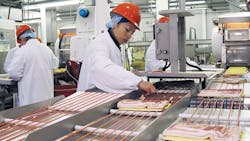Expansion Management: Food Manufacturers Flock to Arkansas
What was true in 1931 is true in 2013 when it comes to food production in Arkansas. John Tyson arrived in Springdale, Ark., in 1931, found a large chicken population and began exporting poultry throughout the U.S. In 2013 Vikon Farms, based in California, came to Arkansas with the intent of exporting chickens, but this time the market is Asia.
Tyson and Vikon Farms are far from the only major food manufacturers flocking to the state. Companies such as Cargill, ConAgra Foods, Frito-Lay, Kraft Foods, Land O'Frost and Nestlé have set up shop. And smaller manufacturers including Ozark Mountain Poultry, Petit Jean Poultry, Pilgrim's Pride, Pinnacle Foods, Riceland Foods, Simmons Foods, Tennessee Pride and Twin River Foods have put down roots, creating a healthy food manufacturing cluster.
See Also: Manufacturing Plant Site Location Strategies
The importance of this industry to the state is evidenced by the fact that it accounted for 21.3% of the total manufacturing payroll last year. Employment in the sector is at 43,262.
Tyson Foods (IW 500/41) is the third largest employer in the state, and they continue to grow. In January, the company completed a $7 million expansion of its Mexican Original tortilla plant in Fayetteville, bringing the total workforce at the plant to 560.
ConAgra Foods Inc. (IW 500/87), whose food can be found in 97% of America's households, also has deep roots in the state. It opened its Russellville location in 1964. With the company's 2012 acquisition of the Bertolli and P.F. Chang's Home Menu frozen meal business, a new production facility was added at the Russellville location.
"Our talented, committed employees will help us make great food here well into the future," Mike Tracy, senior vice president of Consumer Foods Supply Chain for ConAgra Foods, explained when announcing the $100 million expansion.
It was also the workforce that Nestlé SA (IW 1000/39) cited when it expand its Jonesboro facility back in 2008.
"The current Jonesboro workforce has shown they are committed to making high quality products at competitive operating costs," said Andy Darley, factory manager.
The high quality workforce in the food production system stems in part from the available education opportunities. Food science-related research facilities include the Dale Bumpers College of Agricultural, Food and Life Sciences; the Institute of Food Science and Engineering (IFSE), part of the Division of Agriculture at the University of Arkansas; and the Arkansas Biosciences Institute at Arkansas State University. The IFSE is part of the state's strategic plan to make sure the sector continues to thrive. Its mission is "to provide technical advances in food processing and packaging that foster safe, energy-efficient and environmentally responsible processing methods that will assure that Arkansas and regional processors remain competitive."
And that is setting a high bar as the current competitive rankings are quite solid. Arkansas holds second place nationally in the production of broilers (chickens bred specifically for meat production), and third in the production of turkey. The state is also the nation's number one producer of rice, and number three producer of catfish.
Recent expansions should help continue to solidify the state's food sector rankings. Last year Peco Foods, a poultry processor, invested $13.8 million to expand its feed mill in Newark, and its processing plant in Batesville, creating a combined 300 jobs. And in February of this year the Global Food Group invested $4.7 million in a new plant that will produce quesadillas, tortillas and burritos.
But perhaps the most telling expansion of this year occurred in the poultry production area when Vikon Farms not only announced plans to reopen a facility formerly home to Petit Jean Poultry, but also to contract with a number of growers from El Dorado and Union County along with a Vikon-supported hatchery in Prescott.
| For more information on how Kansas is preparing its workforce, see iw.com/Arkansas-Educate. |
"Vikon Farms is doing more than bringing jobs; they're building agricultural partnerships with growers in our region," explained Gov. Mike Beebe. This collaboration should keep an important supply chain within the state's borders.
